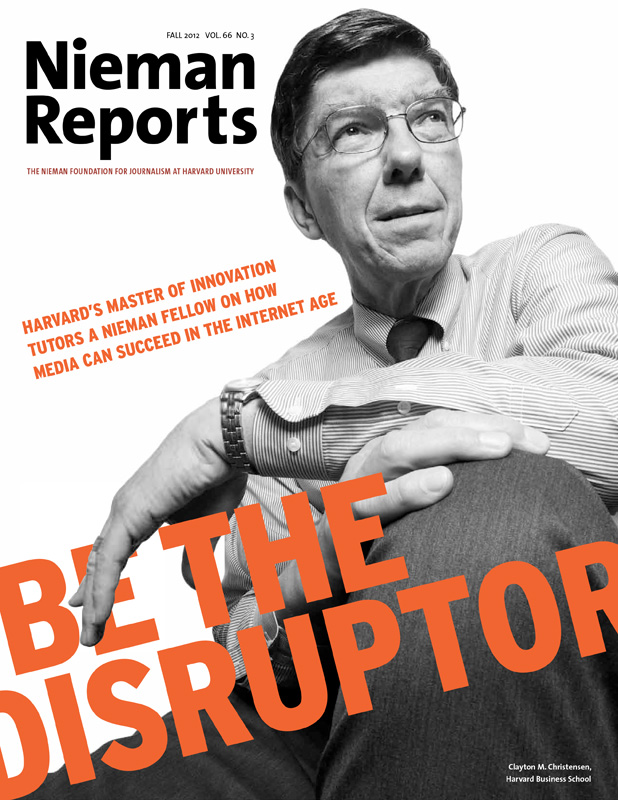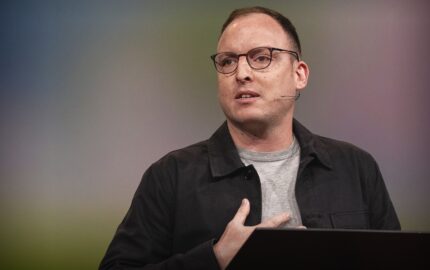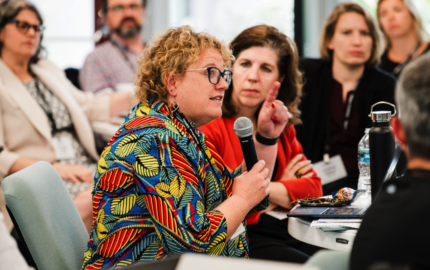In the four years since ProPublica started publishing, the nonprofit investigative reporting outlet has broken new ground on a number of fronts. It has gained a wide audience through partnerships with The New York Times, the public radio program "This American Life," and the "Frontline" public television series. By sharing its "Dollars for Docs" database, it has helped more than 125 news outlets across the country report on local doctors who were paid by drug companies togive speeches. For its reporting on post-Katrina life-or-death decisions and the 2008 financial meltdown, it earned two Pulitzer prizes.
Stephen Engelberg, an 18-year veteran of The New York Times who founded the paper's investigative unit, has been ProPublica's managing editor since 2008. In January, he will succeed Paul Steiger as editor in chief, overseeing a newsroom staff of 34.
Engelberg visited the Nieman Foundation in September after attending a discussion at Harvard Business School about the economics of ProPublica.
In conversation with Nieman Foundation curator Ann Marie Lipinski, NF '90, Engelberg discussed the nonprofit's strategy and future. What follows is an edited excerpt:
One thing we've discovered at ProPublica is that as the technology and the field move, if you're nimble enough, you actually get a chance to erase all of your mistakes and start again. We weren't great at Facebook. But we have been quite successful in using Twitter as a way to get stories out. Sadly, I'm sure at some point they'll Etch A Sketch that away and there will be something else we'll have to figure out.
Our entire purpose in life is to do journalism that brings change. So the point of having traffic is to get stories to people so they'll read them and become outraged and force change, or that a person who could change things will read them.
The first thing I decided when I got to build my own organization was that the people who did the Internet and wrote code and did digital stuff would sit in the middle of the newsroom, would attend every news meeting, and would be treated exactly like everybody else. They would be part of every meeting, every conversation about reporting, because I wanted them to be completely integral to the operation. And that has been a very successful strategy. This "Dollars for Docs" thing resulted from a hallway conversation between one of the code writers and one ofthe reporters. And the next thing you know we're writing some complicated piece of code that's scraping 14 different drug company websites.
I don't see, at the moment, a clear revenue path. A paywall for ProPublica, given the size of our traffic, would produce a little money and probably drive a lot of people away.
I am insane about financial jargon. I will not allow it on ProPublica. Every now and again somebody will say, "I read your story on CDOs [collateralized debt obligations], and I actually understood it." And I think, "Wow, that's it, my year is made."
I won't lie to you: It's tricky. We had a reporter, in the last year, write a sentence about a person who he thought was not such a great guy, and maybe he was and maybe he wasn't, but he'd just promised to give us a bunch of money. So December 31 will come and we'll see how aggravated this guy was. But it wasn't a nice sentence. I was fortunate enough to have no idea that this guy was giving us money.
Stephen Engelberg, an 18-year veteran of The New York Times who founded the paper's investigative unit, has been ProPublica's managing editor since 2008. In January, he will succeed Paul Steiger as editor in chief, overseeing a newsroom staff of 34.
Engelberg visited the Nieman Foundation in September after attending a discussion at Harvard Business School about the economics of ProPublica.
In conversation with Nieman Foundation curator Ann Marie Lipinski, NF '90, Engelberg discussed the nonprofit's strategy and future. What follows is an edited excerpt:
One thing we've discovered at ProPublica is that as the technology and the field move, if you're nimble enough, you actually get a chance to erase all of your mistakes and start again. We weren't great at Facebook. But we have been quite successful in using Twitter as a way to get stories out. Sadly, I'm sure at some point they'll Etch A Sketch that away and there will be something else we'll have to figure out.
Our entire purpose in life is to do journalism that brings change. So the point of having traffic is to get stories to people so they'll read them and become outraged and force change, or that a person who could change things will read them.
The first thing I decided when I got to build my own organization was that the people who did the Internet and wrote code and did digital stuff would sit in the middle of the newsroom, would attend every news meeting, and would be treated exactly like everybody else. They would be part of every meeting, every conversation about reporting, because I wanted them to be completely integral to the operation. And that has been a very successful strategy. This "Dollars for Docs" thing resulted from a hallway conversation between one of the code writers and one ofthe reporters. And the next thing you know we're writing some complicated piece of code that's scraping 14 different drug company websites.
I don't see, at the moment, a clear revenue path. A paywall for ProPublica, given the size of our traffic, would produce a little money and probably drive a lot of people away.
I am insane about financial jargon. I will not allow it on ProPublica. Every now and again somebody will say, "I read your story on CDOs [collateralized debt obligations], and I actually understood it." And I think, "Wow, that's it, my year is made."
I won't lie to you: It's tricky. We had a reporter, in the last year, write a sentence about a person who he thought was not such a great guy, and maybe he was and maybe he wasn't, but he'd just promised to give us a bunch of money. So December 31 will come and we'll see how aggravated this guy was. But it wasn't a nice sentence. I was fortunate enough to have no idea that this guy was giving us money.




